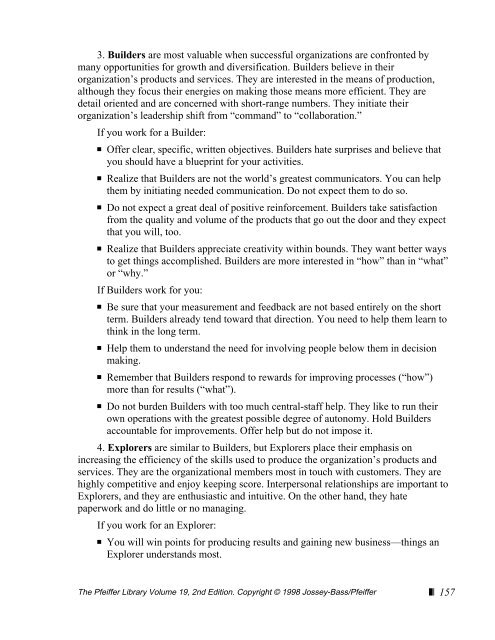motivational analysis of organizations
motivational analysis of organizations
motivational analysis of organizations
You also want an ePaper? Increase the reach of your titles
YUMPU automatically turns print PDFs into web optimized ePapers that Google loves.
3. Builders are most valuable when successful <strong>organizations</strong> are confronted by<br />
many opportunities for growth and diversification. Builders believe in their<br />
organization’s products and services. They are interested in the means <strong>of</strong> production,<br />
although they focus their energies on making those means more efficient. They are<br />
detail oriented and are concerned with short-range numbers. They initiate their<br />
organization’s leadership shift from “command” to “collaboration.”<br />
If you work for a Builder:<br />
■ Offer clear, specific, written objectives. Builders hate surprises and believe that<br />
you should have a blueprint for your activities.<br />
■ Realize that Builders are not the world’s greatest communicators. You can help<br />
them by initiating needed communication. Do not expect them to do so.<br />
■ Do not expect a great deal <strong>of</strong> positive reinforcement. Builders take satisfaction<br />
from the quality and volume <strong>of</strong> the products that go out the door and they expect<br />
that you will, too.<br />
■ Realize that Builders appreciate creativity within bounds. They want better ways<br />
to get things accomplished. Builders are more interested in “how” than in “what”<br />
or “why.”<br />
If Builders work for you:<br />
■ Be sure that your measurement and feedback are not based entirely on the short<br />
term. Builders already tend toward that direction. You need to help them learn to<br />
think in the long term.<br />
■ Help them to understand the need for involving people below them in decision<br />
making.<br />
■ Remember that Builders respond to rewards for improving processes (“how”)<br />
more than for results (“what”).<br />
■ Do not burden Builders with too much central-staff help. They like to run their<br />
own operations with the greatest possible degree <strong>of</strong> autonomy. Hold Builders<br />
accountable for improvements. Offer help but do not impose it.<br />
4. Explorers are similar to Builders, but Explorers place their emphasis on<br />
increasing the efficiency <strong>of</strong> the skills used to produce the organization’s products and<br />
services. They are the organizational members most in touch with customers. They are<br />
highly competitive and enjoy keeping score. Interpersonal relationships are important to<br />
Explorers, and they are enthusiastic and intuitive. On the other hand, they hate<br />
paperwork and do little or no managing.<br />
If you work for an Explorer:<br />
■ You will win points for producing results and gaining new business—things an<br />
Explorer understands most.<br />
The Pfeiffer Library Volume 19, 2nd Edition. Copyright © 1998 Jossey-Bass/Pfeiffer ❚❘ 157

















